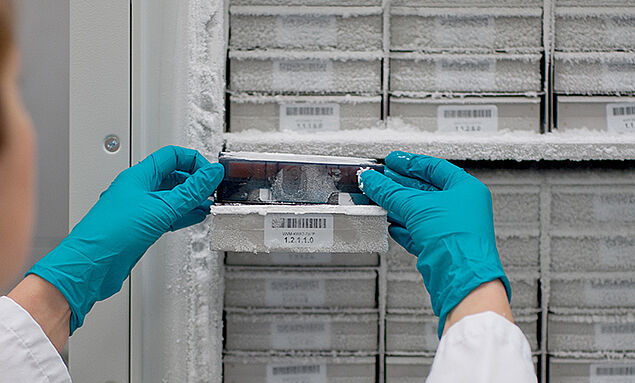Quality-assured biobanks have become an indispensable basis for medical research in recent years. They contribute to the development of new preventive measures, improved diagnostic options and better treatment approaches. “Doctors in the clinic or practice are the first point of contact for patients with questions about biobanks. Therefore, it is even more important for us to provide reliable and practical information for them about this area of medicine.” These were the words of the President of the German Medical Association, Prof Dr Frank Ulrich Montgomery, upon publication of the information paper “Medical, Ethical and Legal Aspects of Biobanks” in Berlin. The German Medical Association (BÄK) had commissioned the development of the document.
A biobank is a collection of human body fluids or tissue samples, which can be linked to health-related data (e.g. medical histories, information on life circumstances). While population-based biobanks collect biomaterial and data from selected donors with no focus on a specific disease (area), clinical biobanks gather biomaterial and their associated medical data from donors with specific diseases in the context of treatment and as part of clinical studies.
What tangible benefits do biobanks have for donors?
The insights gleaned from biobanks are intended for research purposes. The general intention is not to provide individual feedback to donors. Nevertheless, particularly chronically diseased patients can benefit, for example, because the general insights gained from biobank-supported research result in new treatment approaches. In the case of diseases with genetic predisposition, improved prevention and therapy might also benefit members of the donor’s family.
What risks need to be addressed?
Regarding the donors’ right to informational self-determination, it should be noted that the collection of samples is accompanied by the collection, storage and further processing of personal health data. The explicit and informed consent of the donor for the extraction and future use of biomaterial samples or data is necessary in all cases. The freedom associated with research and medical practice does not make this requirement redundant. The consent only becomes effective if the relevant person has been appropriately informed about the purpose, significance and scope of the physical intervention(s). So-called vulnerable groups, including children or disabled persons, require special protection.
To minimise potential risks, samples should be anonymised or pseudonymised making it impossible for researchers to assign the samples to a particular donor. Nevertheless, the risk of re-identification cannot be ruled out entirely, especially if the donor him- or herself has made genetic data publicly available. If data of the donors is to be collected, processed or used in personalised form, the data protection laws – also the EU General Data Protection Regulation valid from May 2018 – always require consent from the donor.
How will incidental findings be handled?
Clear rules should be outlined in the agreement between the donor and the biobank regarding the notification or non-notification of clinically relevant data, which can be considered as incidental findings. Outcomes of such an agreement can be that the donor decides not to be informed about unexpected results from analysing his/her samples – even if these might be important for his/her health – or that the donor decides that all relevant results should be communicated to him/her.
The handout “Medical, Ethical and Legal Aspects of Biobanks” was commissioned by the Executive Board of the German Medical Association. It was developed by an interdisciplinary working group of the Scientific Advisory Board led by Dr rer. nat. Bärbel-Maria Kurth and Prof Dr med. Dr h. c. Manfred Dietel.
Information paper “Medical, Ethical and Legal Aspects of Biobanks” [PDF]
Accompanying article “Biobanks - Indispensable for Medicine” [PDF] Deutsches Ärzteblatt | Vol. 114 | Issue 50 |15 December 2017




